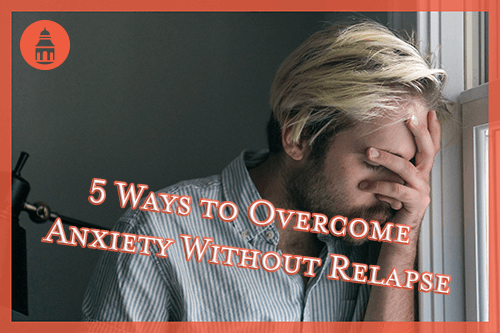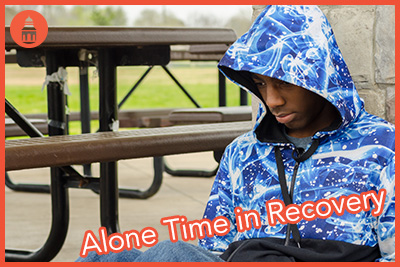
Anxiety can be triggered by trauma, depression, or an anxiety disorder related to a specific situation or issue, and for people in recovery from addiction, diagnosis with an anxiety issue is common. For many, the “go-to” response to those symptoms was to drink and use drugs, so in recovery, it is important to find new and healthy ways of managing feelings of fear, panic, and anxiety in order to ensure that they do not trigger a relapse.
- Turn the amped-up energy of anxiety into active excitement. Anxiety can feel like agitation: pacing, clenching hands, grinding teeth, tapping, and shaking. It is the result of a lot of adrenaline coursing through you in response to a stressor, trauma, or fear that you are facing, and it is hard to go from this high level of energy to calm with the flick of a switch. Instead, you can try to redirect your energy into excitement. For example, if you are anxious about flying, you can try to transform that panicked feeling into excitement about your upcoming trip.
- Count your inhales and exhales. You’ve heard of counting sheep to fall asleep at night? Counting your breaths can have the same effect, slowing down your breathing and heart rate and pulling your attention away from the stressor to one neutral focus. Once you feel comfortable counting breaths, you can begin to count how long you inhale and how long you exhale and work up. For example, you might start with breathing in for three counts and exhaling for three counts, then extend that until you are inhaling and exhaling for six counts each. When you can inhale for six counts, hold for four, and exhale for 8-10 counts, your body and your mind should be in a relaxed state.
- Pour a cup of green tea. Not only are there components in green tea that can help you to calm down, the act of turning your attention to the process of making tea can be calming in itself. Getting out the tea leaves or teabag, boiling the water, steeping the bag, sipping – all this is a process that can help you to shift your focus from the stressor and more easily transition into a state of calm.
- Imagine yourself doing your favorite relaxation technique. Picture yourself doing your favorite resting yoga pose on the mat. Hear the music playing softly in the background and the feel of the stretch in your body. Or, see yourself on the beach or by the pool, eyes closed and enjoying the warmth of the sun and the sound of the water. Whatever it is that you do to feel calm and peaceful, take a moment to imagine yourself in that place, fully enjoying the experience whenever you feel anxiety build.
- Focus on something that is physically right in front of you. No matter what it is that has you feeling panicked, anxious, or fearful, give yourself permission to turn your focus on a physical object that is right in front of. Whether it is a plant or tissue box on a table at an interview, a poster in the doctor’s office, or the keys in your hand, make the choice to channel the anxious energy into that object. This can help you to take a mental break from the thoughts in your head and give your body a moment to slow down.
If anxiety is routinely causing you to feel cravings for drugs or alcohol, it is a good idea to talk to a substance abuse treatment professional who can assist you. Learning how to stay sober means finding ways to manage difficult emotions without relapse, and that always means seeking comprehensive treatment for co-occurring mental health disorders and/or addressing underlying issues with trauma through therapeutic care.
Though you cannot control what life throws your way or even how your brain and body initially process and interpret events and situations, you can learn how to control your response. Even though anxiety often makes you feel completely out of control, the fact is that you have within you the power to continually make positive choices that support you in managing challenges without relapse.
How do you handle anxiety in recovery?



